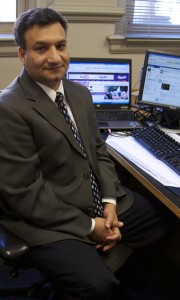There is a Stephen King novel called “Cell,” in which a signal, transmitted via cell phone, turns almost everyone into crazed zombies. Saint Louis University professor Morris Kalliny studies a different kind of signal, one broadcast to satellite dishes and from wifi routers– a signal that, instead of zombifying those it affects, is changing forever the politics of the Middle East.
A professor of international business and marketing, Kalliny looks at “why people do what they do in an international context.” He focuses on the Middle East, trying to figure out how various media outlets are changing that region’s society.
Kalliny was born in Egypt, where he lived until he was 18, when he went to study in Lebanon. He earned a bachelor degree in Business and Education, eventually moving to the States where discovered a passion for international business, earning a doctorate degree in international business and marketing. He earned tenure at University of Missouri – Rolla, but decided he wanted a change and applied for his current job at SLU.
In the midst of the revolutions in the Middle East, Kalliny has been called on by local media organizations to comment on the situation. He credits the upheavals to the increasingly prevalent satellite TV networks in the region, as well as people’s willingness to invest in education.
“When I was growing up, there was one private university in the entirety of Egypt, which was the American University in Cairo. Now they’re everywhere,” Kalliny said.
The combination of more people going to school and the rise of non-political television leads to a population with a greater interest in other cultures than ever before.
“This Egyptian region has been sort of closed-in for a long, long time, and now it’s opening up beyond belief,” Kalliny said.
His experience with clashing cultures is not just limited to the current conflict in the Middle East. While working as a tour guide to pay for high school, he spent time with an American missionary couple. While visiting a market, the Americans wanted to buy just one apple. Due to the way in which stall owners sell their produce (by weight, not numbers) it was impossible for Kalliny to buy that single apple, and he had difficulty explaining the reasons to both parties.
“I tried to explain to them that they could not buy an individual apple, and they said ‘Why?’ Kalliny said, “I said that the guy who is selling the apple does not have any way of being able to equate how much an apple would be worth because he is only [measuring in terms of] a kilo, half a kilo, a quarter of a kilo – a kilo is about 2.2 pounds. They had the hardest time with that,” Kalliny said.
The stall owner could not price a single apple; the Americans could not see why it was so difficult to buy a single unit of produce.
“That is the kind of simple story which illustrates how we get so set in our ways,”he said.
The now-widespread access to foreign television programs, as well as the rapid sharing of cultures through social media, is changing the way the Middle East operates.
“People … in the past were happy with what they got because they did not see a whole lot of alternatives,” Kalliny said, “They were not aware that there are different kinds of lives out there, and once you have social media,and mass media outlets, then you see a different way of life.”









